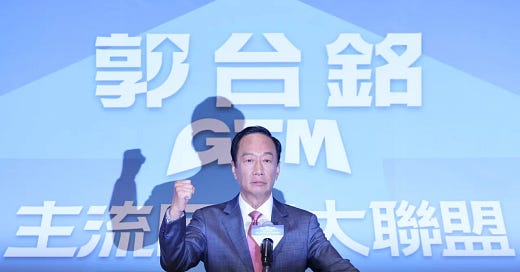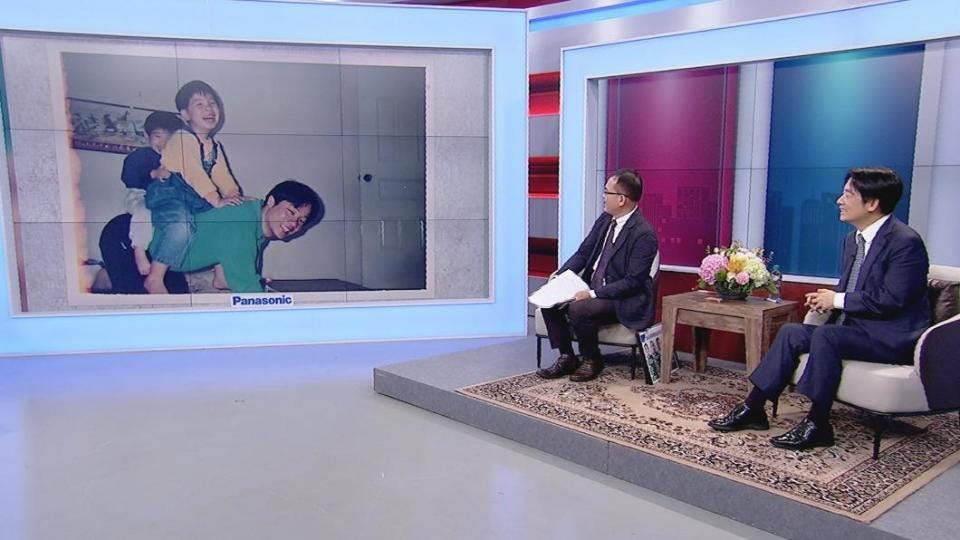Terry’s Game
Taiwanese tycoon Terry Guo Tai-min has finally declared his 2024 presidential candidacy. But in a crowded field where the incumbent Vice President is pulling ahead, what is his path to victory?
And there were four. Although it’s been patently obvious for month now that Foxconn founder Guo Tai-ming would be running in Taiwan’s 2024 presidential elections, his actual announcement did not come until this morning. He’ll be running, of course, as an independent, after being spurned by the Kuomintang (KMT) as a candidate back in May.
“Give me four years,” he said at his announcement presser, “and guarantee I will bring peace to the Taiwan straits for the next fifty years. I will double our rate of economic growth from next year, and in 20 years the GDP per capita of Taiwan will surpass that of Singapore.”
In fact, Guo appears to be running on a platform of “Singaporization.” Friendlier to China, friendlier to business, a heavy emphasis on the development of the technology sector. The question is, he’s now the third candidate in a crowded field challenging the ruling DPP’s candidate, Vice President Lai Ching-te.
What makes him think he can win?
DPP surging
It’s true that after almost 8 years of Democratic Progressive Party (DPP) rule, the electorate had a lot of pent-up frustration and has been casting around for alternatives. This is why the DPP absolutely got clobbered in 2022’s “9-in-1” elections. The big question is can the “pan-Blue coalition” translate their local election success to the national race.
For a while it looked like there’s a chance. Lai’s support hovered stubbornly around 35%, leading to the formation of a strong belief that he had a “support ceiling” that he can’t break through at that point. Meanwhile, his two opponents Hou You-yi (of the KMT) and Ko Wen-je (of the Taiwan People’s Party, TPP) split the non-DPP vote. But if you added up Ko and Hou’s vote, they would beat Lai handily.
All this changed with a poll in early August by the Taiwan Public Opinion Foundation’s (TPOF) that sent shock waves through Taiwanese politics showing Lai on top with 43% support with Ko at just 26.6% and Hou support collapsing precipitously to 13.6%. Even if there was a perfect consolidation of their votes, Ko plus Hou can no longer defeat Lai.
The poll’s validity was immediately attacked, with many simply refusing to believe it. Michael Yu (游盈隆) of the TPOF, who has been working in Taiwanese polling since 1977, dismissed the attacks on his methodology (and integrity) by those left in shock.
“The idea that there is an unbreakable ceiling support for any candidate is simply unfounded,” he said in a radio interview, “it’s a manufactured idea.”
Since then, other polls have corroborated the idea that Lai’s support can indeed break out above his “ceiling.”
“The voters are indeed looking for an alternative, to the DPP” said Yu, “but after looking at the alternatives, they weren’t impressed by what was on offer.”
Three Little Pigs go to the polls
So if Ko and Hou can’t get the job done and Lai is pulling ahead, why does Guo think yet another candidate to split the non-Lai vote would help matters?
Guo used the story the Three Little Pigs to explain his strategy. In the fairy tale, the eldest of the pig brothers built his house out of straw. When the big bad wolf huffed and puffed and blew his house down, he ran to seek shelter at his younger pig brother’s house, which was made out of wood. But the big bad wolf blew that house down too. In the end it was the littlest pig brother who saved the day, for he had built his house out of brick.
In Guo’s mind, he is that littlest pig (certainly the one that’s lowest in the polls) who can nevertheless save the day, if only the other little piggies will see reason and come to his house. It utterly defies conventional electoral logic. If there is consolidation amongst the opposition, Ko has a claim as being higher in the polls and Hou has the backing of a large party with ample resources and boots on the ground. How could Guo possibly position himself at the top of the ticket?
Hostile takeover
Terry Guo is a political neophyte who never held office before and probably got played pretty hard by the KMT earlier in the year. With the KMT nom dangling in front of him, Guo rashly promised to support whoever the party chooses as a candidate. Oops! It was not him.
But what Terry Guo got exceptionally good at on his way to building Foxconn up to the world’s top contract electronics manufacturer is hostile takeovers. One of his favorite gambits was giving a lower-tier manufacturer a huge order for components and then slow-rolling the payment until his acquisition target is on the verge of going under. He can then snap the company up for pennies on the dollar.
His plan to force the merger of the opposition forces on his terms is just as stone-cold. If he stays in as spoiler, he can guarantee they all lose. But if either Ko or Hou agrees to be his second-in-command, there is still the possibility (though fading) that they can eke out a victory over Lai.
The game-theory reason why he might win this game of chicken is because Guo is ONLY interested in the top job. The vice presidency or the fate of pan-blue legislators etc etc are totally inconsequential to him. But for career politicians like Ko and Hou, being in the winning coalition, even under the galling condition of serving under Terry Guo, is far from nothing. It would be especially tempting for Ko Wen-je. His young Taiwan People’s Party is starving for experience in government and he’s keenly aware that their current popularity can be a flash in the pan. Being the ruling party even in coalition would be a huge step towards building his party up into an enduring force in Taiwanese politics.
“Lai can win lying down”
While all this drama and skullduggery is happening, Vice President Lai is running a leisurely, normal and excruciatingly boring campaign. The most excitement he generated was probably when he quipped that he’d like to have dinner with China’s Xi Jinping. Otherwise, he’s really stayed above the political fray, rarely even referring to his opponents. He gave an interview to Bloomberg, did a diplomatic visit to Paraguay, went on a talk show where he showed pictures of himself as a young Dad playing with his kids.
This does not mean the DPP is complacent. They were too wounded in the 9-in-1 elections to be anything but highly paranoid towards any potential misstep. When a press firestorm engulfed former DPP legislator Lai Ching-lin for landing in a cushy job leading a highly-profitable renewable energy development company, he promptly resigned. There was no proof of impropriety, but the swiftness of the exit shows the DPP has something their opposition sorely lacks — discipline.
There’s still almost 5 months to go until Taiwan goes to the polls in mid-January 2024. But unless a sudden, unambiguous and amicable consolidation happen with “the three little pigs” in the next few days, Taiwan’s 2024 presidential election will be in garbage time with nothing but sideshows and squabbles on the way to Lai’s coronation.






郭董 finally made up his mind! (With a little help from Mazu, of course)
In all seriousness though; I don't see the point? I think he's doing this to force Ko into a corner since both of them seemingly would attract similar demographics to their base, but I don't think that Ko will yield in any sense. Politics makes strange bedfellows, but its not hard to see how its nearly over, barring all 3 consolidating under one candidate.